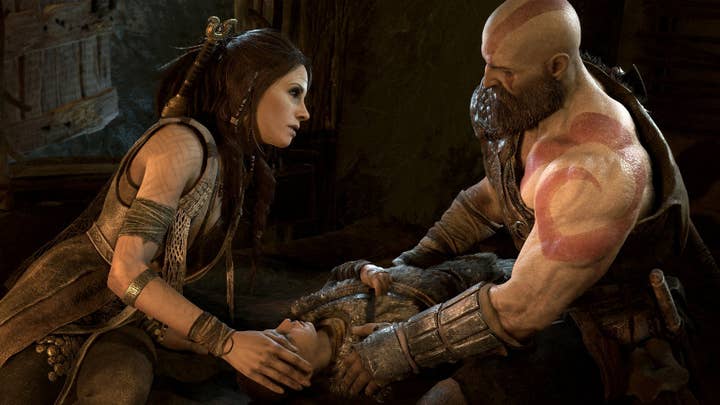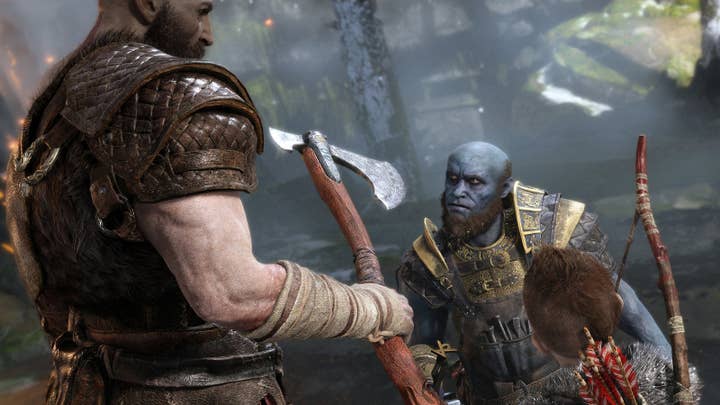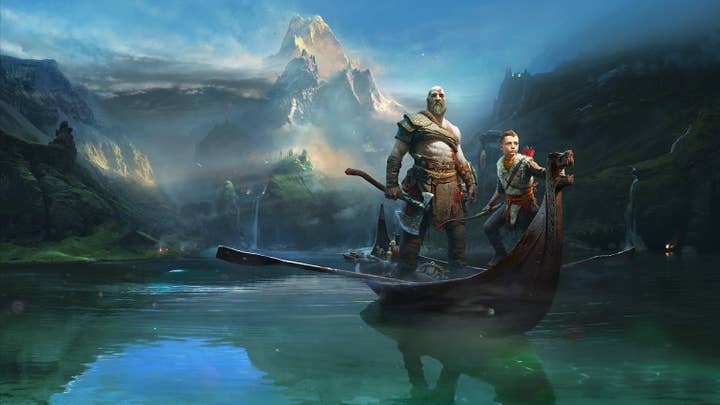God of War | Why I Love
Xuan Yuan Sword 7 producer Golgi Yang admires Sony Santa Monica's 2018 reboot as a reference point developers can aim for and learn from
Why I Love is a series of guest editorials on GamesIndustry.biz intended to showcase the ways in which game developers appreciate each other's work. This entry was contributed by Golgi Yang, producer of Xuan Yuan Sword 7, a third-person action RPG set for release on Xbox One and PS4 next week.
When it comes to God of War, many of the team members and I associate it with the wonderful feeling of thrashing foes, brazen beheadings, and the story of one man challenging a pantheon of gods. As such, we had high expectations for the battle mechanics of the newest installment. It turned out that not only did God of War (2018) meet those expectations, but completely surpassed them in so many other aspects.
In the older God of War games, Kratos was more of a loner. Most people he meets he kills, and while they provided an exciting, action-packed thrill, they didn't exactly tug on the heartstrings. The God of War reboot fixed that.
From the moment the game starts, series stalwart Kratos' new son Atreus cleverly guides the player on their journey, and it's through these conversations that we establish the dynamics between this father and his newly introduced progeny. This makes their quest to fulfill the last wish of Kratos' late wife (and Atreus' mother) feel emotionally charged in a way the series had never been before. God of War unequivocally deserves two thumbs up for maintaining the unique features of the franchise (the aforementioned thrashing and beheadings of foes and challenging of gods), while giving it room to grow with this newly introduced family dynamic.

I never imagined that the God of War series, which is famous for its button-mashing gameplay and ludicrous characters, would undertake such a drastic change in tone. The addition of the delicate portrayal of emotions between father and son is nothing short of amazing and it's perfectly integrated into the game experience. I must admit that I was largely inspired by God of War's writing and game design when I subsequently developed my own games.
By being so focused on such a small cast and staying in their point of view, it gives each story beat more emotional depth than most games in the genre
Case in point, before working on the script of Xuan Yuan Sword 7, we analyzed the biggest single-player games on the market using famed screenwriter Blake Snyder's 15 beat plot structure. What we found was that the themes of these games mostly revolved around "familial ties," and to a certain extent, fit the plot structure suggested by Blake Snyder. God of War was no exception, but it followed these plot beats so gracefully that it never felt like it was adhering to a formula.
It didn't overcomplicate its plot (despite being a sequel), and did an exemplary job of introducing us to this family, and telling the story from these two people's perspective. By being so focused on such a small cast and staying in their point of view, it gives each story beat more emotional depth than most games in the genre. By the end, I was really invested in the relationship between Kratos and Atreus, which made God of War's storytelling a huge inspiration for Xuan Yuan Sword 7.
Another neat trick God of War pulled off was giving the whole game the illusion of being a single take production with seamless transitions. From the title screen to the plot and on to the battles, the number of loading screens were minimized, thereby improving visual fluency and smooth control for an immersive gaming experience. Needless to say, the coordination and planning of the game and its performance must have been incredibly challenging with many constraints.
I felt compelled to explore every nook and cranny designed by God of War's developers
Getting the game and the plot to meld together seamlessly requires careful design of both aspects. Each time a battle ends, every facet of the game, such as the player's position, orientation and plot triggers, has to be carefully designed so they don't jar with each other if you end a battle in one position while the story wants you to be somewhere else. Instead, it all feels completely seamless.
Another aspect of the God of War's gameplay mechanics that I enjoyed was the ability to interact with the environment. Many levels require the Leviathan Axe in order to get through challenges such as a blocked path, or to facilitate the collection of items. Furthermore, seeing as how the Leviathan Axe boomerangs back when thrown randomly, I often had the urge to throw it when encountering a new environment in the hopes of getting a surprise as it made its way back to me.
Combined with great level design, I felt compelled to explore every nook and cranny designed by God of War's developers. Indeed, this level design was also a point of reference for Xuan Yuan Sword 7, as many on the team love puzzle-solving and interactive controls.

When it comes to visual art, the team cannot praise God of War's visuals highly enough. The realistic tone creates a compelling overall story, a remarkable feat considering that the story is entirely fictional. One of my favorite things about God of War is how it encapsulates its worldview through its character design. Compared to the previous installments in the series, there is more of a human touch this time around. On a story level this could be attributed to Kratos having become a father, but this is complemented by a more emotive motion and facial capture than we've seen before. Kratos, and the characters he encounters, look far more human than the more cartoonish renditions we saw in previous iterations of the series.
God of War may be about fantastic gods and creatures, but it feels grounded and believable -- even relatable -- thanks to its surprisingly naturalistic presentation
The environments are likewise believable and eye-catching, with top notch lighting and textures making God of War's mythological setting seem realistic and natural. It certainly set a high visual standard. This standard is very different from most Asian-made games, which mostly take a more symbolic approach to game visuals, utilizing exaggerated shapes as well as bright and colorful designs to emphasize their unusual characteristics. God of War may be about fantastic gods and creatures, but it feels grounded and believable -- even relatable -- thanks to its surprisingly naturalistic presentation.
We wanted to take this tone and apply it to Xuan Yuan Sword 7, as its storyline likewise incorporates a lot of mythology, only in this case it's Chinese mythology. In order to enhance the atmosphere of the story and create a historical feel, we drew reference from God of War's realism when deciding on the visual style. The character design in Xuan Yuan Sword 7 also embodies the more naturalistic spirit of God of War, resulting in a vastly different style compared to other China-themed games. The end result was that the characters looked a lot more like real people trying to survive in a world in chaos.
Last but not least, another thing I admire about God of War is its audio design, as its sound effects are phenomenally compatible with the game visuals. An example that comes to mind is the sound of Kratos's axe flying back to him. The sound of wind cutting increases as the axe gets closer to him, which really sells the idea that this is a real tool with heft and weight. This flavor of detailed concreteness can be seen everywhere in the game.
Another thing I love about God of War's sound is its audio mixing. As you engage in battle and have several enemies roaring around you, it never overpowers the music and other sound effects to become harsh on the ears. Instead, you're able to hear all the information you need to hear (like enemy attack audio cues), without feeling noisy or disjointed. God of War's audio is truly at the top of its class, and it was a major reference point for our audio team as they had to convey the enormity of a giant boss monster slamming against their environment with maximum impact.
As the latest installment in the series, God of War has undoubtedly taken the brand to new heights. I admire and respect such games from the bottom of my heart, as their success serves as an important point of reference for other brands' games. The 2018 God of War reboot provided the perfect blueprint for how to take an already successful franchise and offer something innovative and new, while still retaining the core concepts that made its forebears such a massive success.
Developers interested in contributing their own Why I Love column are encouraged to reach out to us at news@gamesindustry.biz.
